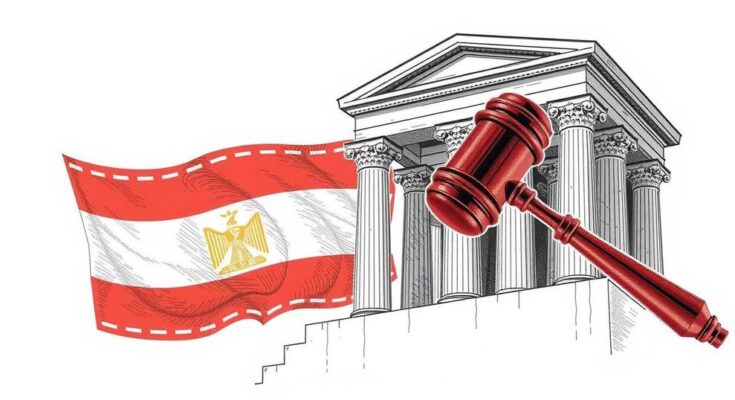Egypt’s parliament advanced a controversial draft to amend the 1950 Criminal Procedure Code, drawing strong opposition from legal, civil society, and human rights groups. Critics argue the new draft perpetuates existing abuses, including prolonged arbitrary detention and enhances prosecutors’ powers at the expense of judicial oversight. The proposed legislation has ignited concerns regarding the lack of meaningful reforms and the continuing repression of political and economic rights in Egypt.
This week, Egypt’s parliament hastily advanced a government-proposed draft bill intended to replace the outdated 1950 Criminal Procedure Code. The initiative has drawn vigorous condemnation from a multitude of stakeholders, including the Lawyers’ Syndicate, the Journalists’ Syndicate, various human rights organizations such as Human Rights Watch, political parties, and independent experts from the United Nations. The expedited approval process, which has largely occurred behind closed doors in a parliamentary subcommittee, raises concerns over the lack of public consultation and the necessity for thorough democratic discussion.
The existing Criminal Procedure Code has permitted prolonged pretrial detention, often extending for months or even years, devoid of adequate judicial oversight or substantiated evidence. Moreover, the code is deficient in defining and penalizing serious offenses, such as torture and enforced disappearance, which are critical in light of the current government practices under President Abdel Fattah al-Sisi. Since his ascension to power in 2013, thousands of dissenters and critics have faced arbitrary detention, prosecution, and, in some tragic instances, death while in custody.
A preliminary evaluation of the new draft reveals that it does not implement substantial reforms; instead, it appears to enhance the powers of prosecutors at the expense of judicial authority, thereby reinforcing the unchecked powers of security forces. Despite assurances from officials, including President Sisi, regarding the reform of pretrial detention practices, the draft only marginally reduces the maximum duration of pretrial detention and fails to align with international standards. Critical provisions that would have ensured that pretrial detention was utilized sparingly are glaringly absent, and prosecutors retain extensive discretion to prolong detention without substantive judicial review.
The opposition to the draft law indicates a resilient civil society within Egypt, which continues to manifest its dissent despite an environment characterized by repression. The proposed legislation, replete with flaws, signals a lack of intent from the authorities to alleviate the extensive human rights abuses rampant in the country. The persistent absence of meaningful reforms to safeguard political and economic rights continues to underscore the deep crisis facing Egyptian society.
The situation surrounding Egypt’s Criminal Procedure Code is a vital issue given the oppressive legal framework that has evolved under the current government. The original code, established in 1950, has come under intense scrutiny due to its failure to protect individual rights, particularly in light of the widespread human rights violations reported since President Sisi’s regime began. High levels of arbitrary detentions and systematic abuses highlight the urgent need for reform, yet attempts at legislative changes are met with strong resistance from various civil society groups advocating for a transparent and just judicial process.
In conclusion, the proposed revision of Egypt’s Criminal Procedure Code has stirred significant controversy, highlighting a widespread demand for judicial reform to protect individual rights and ensure transparency. The shortcomings of the draft underline the persistent issues of arbitrary detention and the overarching influence of security forces over the judicial system. The opposition from various sectors of society serves as a reminder of the undeterred spirit of civil society, relentlessly advocating for justice and accountability in a climate of repression.
Original Source: www.hrw.org




